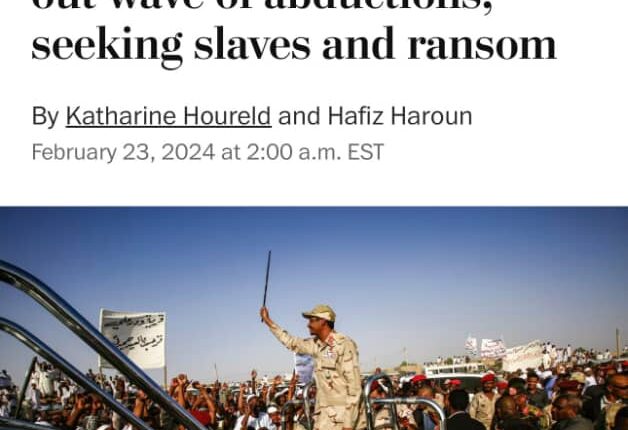The Washington Post Sudanese militiamen carry out wave of abductions, seeking slaves and ransom
By Katharine Houreld and Hafiz Haroun
February 23, 2024 at 2:00 a.m. EST
NAIROBI — Since civil war erupted in Sudan last spring, paramilitary fighters battling the country’s army have carried out a campaign of abductions, kidnapping civilians for ransom or pressing them into forced servitude, according to 10 victims who have since been released and other witnesses.
Elements within the Rapid Support Forces, which have captured most of the capital, Khartoum, and swept across most of the western region of Darfur, have made these abductions a lucrative source of revenue, victims, other witnesses and activists said.
Some of the victims said they have been enslaved and sold to work on the farms of RSF commanders, and others recounted being held while their families were forced to ransom them. Some victims said they were seized several times. Among those abducted, witnesses and activists said, have been girls and young women who were chained, bound and sold as sex slaves.
Fighting broke out in April after the collapse of a power-sharing arrangement between the Sudanese army, headed by Gen. Abdel Fattah al-Burhan, and the RSF, headed by Gen. Mohamed Hamdan Dagalo, universally referred to as Hemedti. The rival forces overthrew a civilian-led government before turning their guns on each other. More than 10.7 million people have fled their homes, making Sudan the world’s largest displacement crisis.
While both sides have been implicated in violence against civilians, witnesses and activists say the RSF has been primarily responsible for the wave of kidnappings. The RSF is composed mostly of ethnic Arab militiamen, and the victims interviewed for this story are Masalit, an ethnic African tribe, though Sudanese of other backgrounds have also been abducted.
The RSF did not respond to requests for comment.
Pressed into slavery
Muhammad Arbab Musa, 21, said he was hiding under a bed when fighters from the RSF stormed the military garrison in the suburb of Ardamata, just outside the Darfuri city of El Geneina, in early November. As many as 15,000 people were killed during that attack on El Geneina, according to an unreleased U.N. report reviewed by The Washington Post, but Musa, a civilian, and his friends managed to survive.
Sudanese paramilitaries seize Darfur cities in major advance, amid massacres
The fighters dragged them from their hiding places and berated them as “slaves,” a term that ethnic Arab fighters previously used to describe ethnic Africans during the previous Darfur war, which began in 2003 and lasted two decades. Atrocities by the military and its allies the Janjaweed — a mostly Arab militia that eventually morphed into the RSF — were so widespread that the International Criminal Court charged the Sudanese president at the time with genocide.
The RSF fighter “said, ‘Get out, you slaves, ’” recalled Musa, who was interviewed in a refugee camp in Chad like others cited in this story. “He killed one of my friends with an ax. … We were beaten with whips.”
Musa said he was taken to another house, where six corpses were sprawled outside, and ordered to work repairing cars. His captors told another RSF soldier that Musa’s group would be killed when they had finished.
But instead, his captors forced Musa hour later onto a motorbike at gunpoint and took him past El Geneina bridge, where he said hundreds of people were at that time being executed, before the RSF fighters were ordered by Hemedti’s brother, Abdul Rahim Dagalo, the group’s second-in-command, to take the men to the Ibn Sina School. There, Musa said, about 500 people were being held. Eventually, he said, he and a group of others were forced to work on local farms.
washingtonpost.com/world/2024/02/…
⬇️

